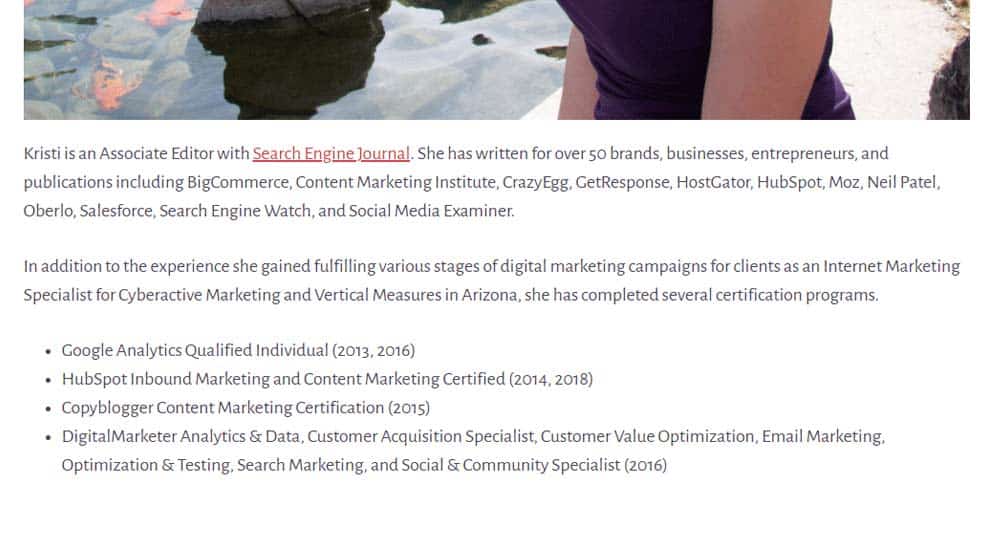The world is filled with paperwork. Everywhere you look, you find people flaunting their titles, going to school to get new titles, or undergoing training to earn certifications to improve their job prospects.
You see it in every industry. Lawyers need to pass the bar. Medical professionals need everything from nursing degrees to doctorates. Even IT has a huge array of certificates for everything from ethical hacking to network administration.
It stands to reason that any career will have certificates, but is that really true? Well, sort of.
Pretty much every possible career you could imagine has an array of possible certificates. The question is, are those certificates worthwhile?
 In the world of freelance writing and copywriting, the answer is no, with a few caveats.
In the world of freelance writing and copywriting, the answer is no, with a few caveats.If you're looking for someone to paint you a picture, which would be more important to you?
For most people, it's that second one.
The same holds true for most creative pursuits. The proof is, as they say, in the pudding. You want someone who can demonstrate that they have the skills and that they can produce work that fits what you want. You wouldn't go to an art school's alumni list and pick an artist blindly, would you? Of course not; you'd look through public portfolios and look for an art style that matches your desires.
Writing is the same way. It doesn't matter if a writer barely has their G.E.D. or if they graduated from Harvard; if they don't produce the kind of writing you want, it's not going to do you any good to hire them.

Likewise, as a writer, it's all about the work you can produce. A certificate isn't going to be proof of anything other than your ability to pay for a certificate.
Writing isn't like IT, where there's a centrally-recognized authority like CompTIA that issues certificates as proof of knowledge. Sure, there are hundreds of universities with writing programs, and you can earn anything from an Associate of Arts to a PhD in Literature, but all those degrees prove is that you can make it through academia.
I've personally known freelance writers who are extremely successful and have never pursued higher education. I've also known writers with advanced degrees who leverage them to great effect and just as many who are toiling to pay off student debt with a degree that has been soundly ignored.
 It doesn't really matter. All that matters is that you can produce the kind of work that a client wants to see.
It doesn't really matter. All that matters is that you can produce the kind of work that a client wants to see.Here's another question. If you get a certificate in copywriting, what does that say? Or, if you're looking at a writer and they tell you they have a certificate in copywriting, what does that mean?
Copywriting is a huge and varied industry. There's a ton of difference between writing a product description, writing a sales-focused landing page, writing general informative blog posts, writing a white paper, writing a press release, writing social media posts… the list goes on.

To an extent, the skills to write one can transfer over to another. Someone who can write a persuasive landing page can probably also write a persuasive blog post. On the other hand, someone used to writing casual, informative blog posts may not know what it takes to write a technical, sales-first white paper. Someone used to writing 300-word product descriptions and 200-word social media posts may not be capable of writing 2,000-word blog posts or 5,000-word eBooks.
Most certificates for copywriting just say something like "certified copywriter" and don't specify in any greater detail what, exactly, that means. And, again, anyone looking to hire a writer is vastly more likely to a) ask them for their portfolio to scope out their past work and b) send them a test project to see how they perform, than they are to care even the slightest bit about the credentials they claim to have.
Another way to look at things is to look at the certificate programs that exist.

If you search for writing certificates, you find things like:
Most of these issue certificates, but those certificates aren't worth the paper they're printed on. No marketing manager is going to be looking for a SkillShare or Coursera certificate. These are the kinds of things promoted by YouTubers as a way for them to make affiliate money, not widely sought-after credentials from accredited schools and programs.
Many of these courses are also quite short. They're small series' of videos, eBooks and self-study packets and tests, or even just tests you can take and see if you can pass them. Many of them don't actually have much in the way of authority or nuance; they test you on things a tool like Grammarly or a headline analyzer can do for you.
As a copywriter, you need the skills to pay the bills. That means being able to showcase your ability to write, and that means having the ability to write in the first place.
Writing skills can be trained! Educational programs are fine for this. Even some of the certificate programs listed above can teach you valuable skills you can leverage in a writing career.

You can learn things like:
The point that I'm trying to make, really, is that the certificates aren't all that valuable, but the skills you learn may be. I'm not here to trash any particular programs. I'm sure some of them are great. Moreover, different people learn in different ways. Some great writers have never studied writing or taken a writing course in their lives. Others got where they are through a ton of structured training.
Again, though, this all ends up expressed through the way you write and the way you market yourself. The content you have in your portfolio, the specialties you promote, and the way you talk about the industry: these all can have an impact on your ability to get a job writing professionally.
Promoting that you have a writing certificate, especially from a site like Udemy or SkillShare, where pretty much anyone can register to create their own course? That's just going to make you look gullible.
Now, as a freelance writer, sometimes certificates can matter. Sometimes they can matter a lot. The thing is, they aren't copywriting certificates. They're certificates in other areas of expertise.
One example is in marketing. If you're a freelancer looking to get into fiction ghostwriting, you don't need marketing experience. On the other hand, if you want to get hired at a content marketing company, having a certificate that shows you know what you're doing might help.
What kind of certificates might be relevant? Indeed has a list here, and though I don't agree with all of them, you can see the kinds of certificates I mean.
Industry-recognized sites like HubSpot, CopyBlogger, or Semrush can all be valuable. This is because:
Take a look at the personal site for Kristi Hines, one of the most prominent freelance writers in marketing. Her profile page lists a few certifications, but they're certifications that are relevant to her specialty in marketing. They aren't certificates that prove her ability to write; they're certificates that prove her knowledge of marketing, analytics, and sales.

That, I would argue, is the kind of certificate you'd be looking for. However, it varies depending on the industry you want to break into.
If you're a freelance writer with a passion for cars, you probably don't need a Google Analytics certificate. You'd be better served with some kind of automotive specialist certification or training. A writer who wants to break into writing authoritatively about software development and network administration could get some of those CompTIA certificates to showcase more than casual knowledge.
You don't need to know enough to do the career – though it can help – but you need to know enough to write authoritatively about it.
 My answer to this one is a solid "maybe."
My answer to this one is a solid "maybe."It all depends on the certificate and your goals.
If you're looking to be a content marketer, knowing the ins and outs of marketing and earning a certificate from a globally-recognized marketing firm like HubSpot can be a great idea. People in the industry recognize their name, recognize their authority, and know that the certificate means something.
On the other hand, getting a copywriting certificate from a course offered on Udemy? Probably a lot less valuable.

I'm not going to say it's worthless. It's always possible that there are businesses and individuals out there who will be impressed by having a certificate, especially if they're used to seeing writers who don't have certificates and don't know enough about the industry to know that certificates aren't terribly meaningful.
At the same time, someone who is familiar with the industry might recognize that a certificate is meaningless and might be skeptical of your abilities if you're promoting having one. It's almost a badge marking you as a novice.
In the worst case, if you paid an exorbitant amount for a certificate – and some of these certificate programs can cost thousands of dollars! – you might become a target for scammers. After all, if you have the money to pay for a certificate, you have the money to pay for the privilege of applying to this definitely real, totally illustrious business' writing crew, right?
More so than a general "copywriting" certificate, though, you can benefit from getting certificates in areas of expertise or special interests. If you know you want to focus on an industry, proving to people in that industry that you're a specialist rather than a generalist can be a big help.
On the flip side, say you're a business owner, hiring manager, or another decision-maker, and you're looking to hire a writer. Should you look for one who has a certificate?
Much like with writers, this depends on the certificate. Think of it how you would consider a degree from a university. A degree in software development from MIT or Virginia Tech is going to be way more valuable than the same degree from ITT Tech.

When hiring a freelance writer, you generally want to look at their portfolio first and foremost. Does their style and their fluency in your topic and language fit with your needs? If so, you can look at things like certifications. Do they have certificates in your industry? At the same time, you can look for other signs of industry expertise, like having worked with other businesses in your industry before or having held a position in the industry before switching to writing. Someone who spent a 20-year career as a network administrator and who pivoted to writing will have a pretty good idea of what goes on in the industry, eh?
Certificates are most relevant when they come from a recognized authority and when they promote a relevant skill. Unfortunately, the majority of the copywriting certificates available aren't actually valuable to anyone other than the company you're paying hundreds of dollars to get it from. You're better off putting in the time to build a portfolio to demonstrate your skills directly.
Have any further questions about copywriting certificates? If so, please feel free to leave a comment down below, and we can continue our discussion on the topic further!
We encourage you to share this article on Twitter and Facebook. Just click those two links - you'll see why.
It's important to share the news to spread the truth. Most people won't.